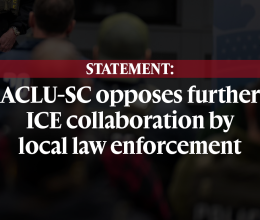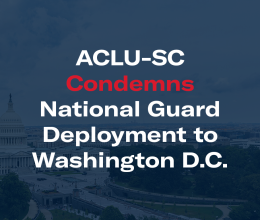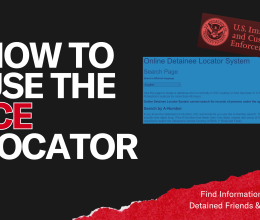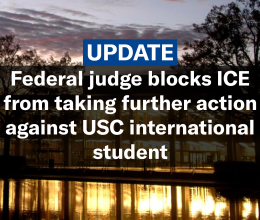
The first South Carolina sheriff’s election under the Trump administration’s mass deportation regime will take place August 5 in Spartanburg County. One important question in this race — and every sheriff’s race — is whether and how prospective sheriffs will collaborate with Immigration and Customs Enforcement.
We pressed the question at a candidates’ forum hosted by the Spartanburg County NAACP on July 15. You can read quotes from the candidates’ responses below. To varying degrees, most candidates said they support the county’s recently signed Warrant Service Officer agreement with ICE, but they varied in their descriptions of how they would carry it out.
ICE collaboration agreements, known as 287(g) agreements, used to be rare. Police leaders were historically among the most outspoken opponents of 287(g) programs, which have a track record of eroding public trust in law enforcement, increasing racial profiling, and diverting local funds to federal law enforcement priorities.
This year brought a dramatic change. In 2024, only 3 South Carolina counties had active 287(g) agreements. In 2025, under pressure from the White House and the South Carolina attorney general, the number of county sheriff’s offices with 287(g) agreements jumped to 19, along with 3 local police departments and the South Carolina Law Enforcement Division.
ARE YOUR LOCAL POLICE COLLABORATING WITH ICE?
One of the new 287(g) agreements this year is in Spartanburg County. Former Sheriff Chuck Wright signed a 287(g) agreement on March 26, just five days before announcing he would take a leave of absence on April 1. The agreement became official on April 2. Wright resigned on May 23 amid an FBI investigation into his spending practices and allegations of drug use.
Spartanburg County voters will choose from nine candidates to fill Sheriff Wright’s position. At the July 15 forum, ACLU-SC Advocacy Director Courtney Thomas posed the following question to all nine candidates:
“Under the leadership of the former sheriff, the county entered a 287(g) agreement just in April of this year. Every candidate on stage has mentioned the need for officer pay and retention, and some have even mentioned needing a balanced budget. As an example, agreements like this have cost counties like Charleston County $4 million of taxpayer money every year. Given that information, will you rescind or leave the 287(g) agreement?”
Portions of the candidates’ responses are quoted below. To hear candidates’ full responses, check out Part 6 of the candidate forum video via Fox Carolina.
Nick Duncan: Keep 287(g)
“I would leave it [in place] ... When someone is in jail, just like we check for warrants, we can check for immigration status, make sure that everyone is here legally. I would work with Immigration to make sure that those individuals are here legally, but as far as knocking on doors just to check for that, I don’t agree with that.”
Adam Crisp: Keep 287(g)
“We are going to partner a thousand percent, and I’m not going to back down. You might not like it, but it’s the honest truth. We have to keep our city and our streets safe. Now, going into churches and daycares and homes like that, of course that stuff right there is not going to be tolerated.”
Joseph A. Pilato: Keep 287(g)
“The ICE vision and mission statement is here to protect us. All the human trafficking, you guys don’t know how bad it is ... You guys have got to understand the importance of what ICE’s role is, not politic it.”
Robert Cheeks: Keep 287(g)
“We have a lot of good people here in Spartanburg County, and all they’re asking for is due process. They’re asking for not worrying about having to see the things like are happening in California, you running into the doctor’s offices and day care centers and churches and things like that and being snatched out of their homes ... We have to afford everybody the protections of their rights. But we have to understand that when it comes to violent criminals who are here illegally, you have a responsibility to be deported. It’s part of what ensures our safety.”
Randy Hollifield: Stance unclear
“I don’t know of any paperwork that was signed by anyone ... I would have to get more information.”
Ric Stephens: Stance unclear
“We don’t need to take any agency whether it’s ICE, federal government, attorney general, we don’t need to take nobody’s advice as case law. My job is to check what they’re saying. Now, in the case they come down and they’re going to get somebody who come into this country unvetted, illegal alien, OK, no problem with that, but I want to check that because you’re not beyond mistake, and I’m telling people they’re going to make mistakes.”
Bill Rhyne: Keep 287(g)
“Yes, I’m staying a part of 287(g) if I’m elected ... When you take the time and you research 287(g), these are not your folks that are immigrants that are living here, that are working at landscaping companies, working construction ... They’re getting illegal aliens that pose a direct threat to the people of the United States of America, and we have a job as law enforcement to ensure that we’re protecting those people in the United States.”
Andy Clark: Keep 287(g)
“Yes, 287(g), and we will protect you and just make sure that there’s probable cause enough to be able to seize these people and those that are here illegally. There’s a right way and a wrong way.”
Rusty Clevenger: Keep 287(g)
“To be very blunt, 287(g), yes, I will be enforcing that. But I have a unique perspective that no one thinks about because all anyone thinks about are the crying children that are put up on the TV cameras and the detention centers ... You have immigrants that are funneling money back to other countries, illegal things that are happening right under your nose. So I understand the importance of making sure that we’re following through with 287(g), but it’s there for a reason.”







